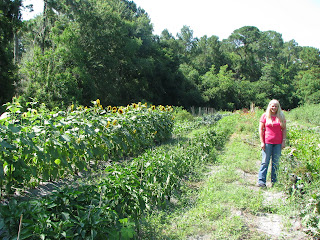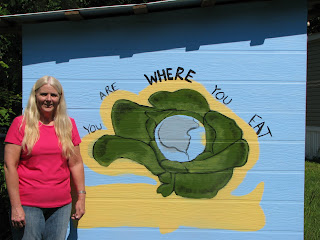
On Thursday, June 10, my husband (Steve) and I visited “Down to Earth” Farm. The address for the farm is 9355 Old Plank Road in Jacksonville, Florida. Brian Lapinski is the owner of the farm. It is a small family farm that began in late 2007. Brian says he and his wife started the farm because they believe in the importance of vibrant, local, sustainably-grown agriculture. His goal is to grow healthy, delicious vegetables in a manner that is gentle on the Earth. He uses compost and CMRI listed products instead of petroleum based fertilizers to feed his plants.
Here is a picture of Brian on his tractor working on the farm:

Down to Earth Farm grows plants year round as follows: Vegetables include: arugula, beets, broccoli, cabbage, carrots, cauliflower, cucumber, eggplant, green beans, green onions, kale, kohlrabi, lettuce, okra, onions, potatoes, radishes, salad greens, salad mix, spinach, summer squash, sweet peppers, swiss chard, tomatoes, winter squash and zucchini; Fruits include: cantaloupes, strawberries and watermelons; Fresh Herbs and also Edible Flowers and Fresh Flowers. When visiting the farm I noted a long row of sunflowers – here is a picture:

He uses organic potting soil and he fights bugs and disease with responsible techniques such as crop rotation and regular scouting. He does not use any chemical pesticides or herbicides. Brian explained that the biggest agricultural challenges he has been faced with are stink bugs and excessive rain. He said the stink bugs are very bad this year and he is putting soap on his plants and kaolin clay to ward off the bugs. I wasn’t sue what a stink bug was so I looked it up and learned they are bugs ranging in color from brown to green and they are recognized by a triangular shaped plate on their backs. They are plant eaters and have an ability to reproduce rapidly. They are particularly common in southern parts of the United States. Stink bugs do not harm you, but they will emit their odorous production, which most people find very offensive to their olfactory senses – hence the name stink bug. The odor of a stink bug does tend to linger, but it can be washed away with soap and water.

The farm grows a wide variety of vegetables that they sell through the Green Market in Neptune Beach, Florida and at the Riverside Arts Market. Brian also has a small CSA for the ease of a weekly share of fresh food and connection to the farmer. I didn’t know what a CSA was, so Brian explained that it stands for Community-Supported or Community-Shared Agriculture and is also sometimes called subscription farming. You buy a subscription from a local farmer and you receive a “share” of fresh, locally grown or raised fruits and/or vegetables and/or eggs. Brian further explained that CSA fruits and vegetables are “in season.” Grocery stores know no seasons and are disconnected from nature (and thus so are the shoppers). With a CSA you know where your food comes from and you eat in harmony with the seasons and enjoy delicious, healthy, pure, fresh foods. You can buy fruits and vegetables from the grocery store – but they are of picked weeks ago and blasted with ethylene gas before being sent to the store. While the supermarkets are convenient for shopping – you lose flavor, freshness, nutritional value and human connection to each other and to the land. He highly encouraged joining a CSA.
While at the farm I also noticed that they had a chicken coop and lots of chickens. Brian said they sell the eggs. Here is a picture of the chickens at the farm:

I enjoyed the trip to the farm. I had a doctor’s appointment that afternoon at 2:00pm (and my husband has to drive me, since I am still in the boot/cast and cannot drive yet) – so we both took off work for the rest of the afternoon. I had emailed and then telephoned Brian to get a time we could come out and meet with him and he had said that afternoon was fine. So after the doctor’s appointment we drove out to the farm. It was easy to find. Brian’s home is in the front of the acreage and you then the farm is out behind his house. He was very friendly and very relaxed. Years ago he probably would have been called a “hippie” – but he is too young to be a hippie. He enjoyed talking about the farm and he was particularly proud of his tomatoes. They were very small and not large like the ones in the grocery store. It is a pretty rural area – but actually not that far from the city. It was very quiet and very little traffic on the road leading up to the farm.
Brian had a wall of one the buildings on the farm with this sign: “You are Where you Eat.” I still am not really sure what that slogan means. Here is a picture of me standing by the sign:

I do not have any personal experience growing plants or gardening. My mother was divorced and worked two jobs and my sister and I stayed home by ourselves most of the time when we were not in school. We fixed our own meals which usually came from canned goods that we would heat up – no fresh vegetables. My husband, Steve, grew up on a farm in Alamo, Georgia. They grew tobacco and cotton. When we first got married, I visited the old relatives on the farm – but they have all died now. My husband’s grandmother lived next door to us years ago and she would always have a garden in her yard. I would watch her work in the garden, but she never liked me to help her because I didn’t know what to do and she just enjoyed doing it all herself. She grew mostly peas and butter beans and other green vegetables and tomatoes. She also had a grape vine and she would make jelly. I would help her make the jelly.
By myself, I could not grow my own food. With my husband’s help and experience we could grow our own food if we had to. He knows how to do it and has done it before. We do have two orange trees in our yard at home and we love growing, picking and eating all of the oranges when they are in season. My husband mentions occasionally that he would like to move to Georgia and live on a farm again. I think that farming is very hard and difficult work. It is extremely weather dependent. Farmers work very hard – from dawn to dusk doing physical labor.
The Down to Earth Farm operates year-round – here is a picture of a row that is dug up and ready to plant:

NOTE:
Picture of Brian Lapinski on tractor from website: http://www.localharvest.org/farms/M32162
Picture of stink bug from website http://www.flowers.vg/flowers/stink-large.htm
All the other photos were taken by my husband at the farm on the day of our visit.
No comments:
Post a Comment